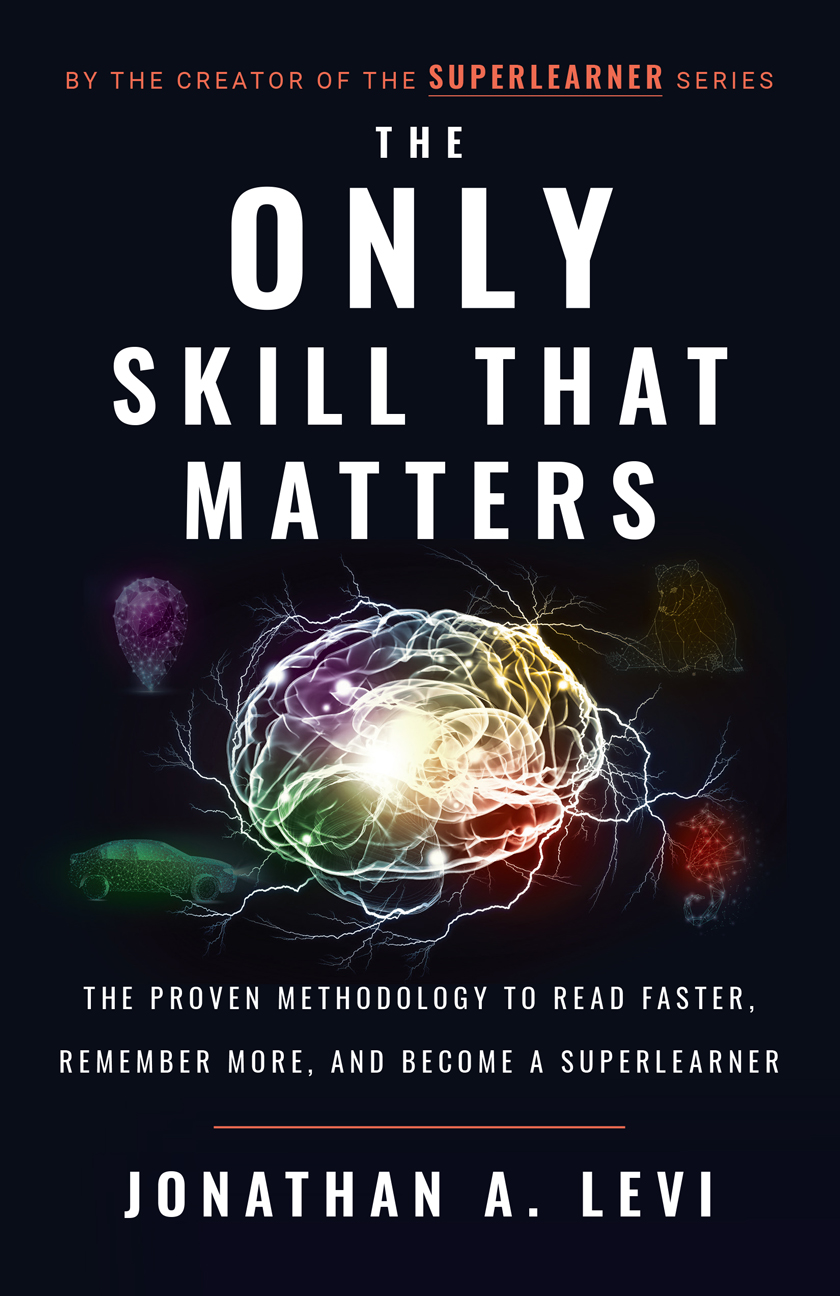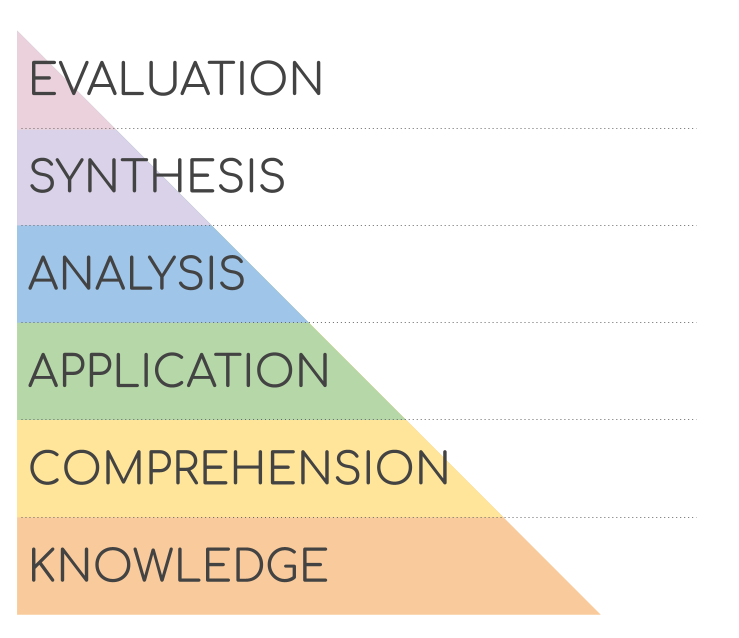The Only Skill that Matters by Jonathan Levi

(New York: Lioncrest, 2019), 181
This book is a lightweight introduction to some concepts of learning, memory, and reading, suitable to introduce the concepts but not master them. More thorough (and better-written) resources for learning and memory include Ultralearning by Scott Young and Memorize the Faith by Kevin Vost.
Levi relies heavily on the six principles of adult learning from Dr. Malcolm Knowles which include: connect what you're learning to prior knowledge, learn with an eye to application, immediately use what you learn, solve actual problems to learn, take ownership of your education, and build intrinsic motivation.
The book builds on these concepts by adding notes on visualization (the method of loci), spaced repetition, SQ3R (i.e. pre- and post-reading), speed reading, and teaching to learn.
While it has some good information, I did not enjoy this book. Its poor quality is evident with the abundance of cliché references (Maslow's hierarchy, SMART goals, Feynman, Tim Ferriss, etc.), immature language ("literally!" and "our dear old friend Dr. Malcolm Knowles"), cheap footnotes to scientific studies, and enough links to "bonus" materials on his website to make the marketing motivation for the book clear. Perhaps these notes will save you the trouble of actually reading it, which thankfully I did not spend much time doing.
Notes
Contents
- Introduction
- Chapter 1: Information Overload and the Explosion of Knowledge
- Chapter 2: The Only Skill that Matters
- Chapter 3: Learn like a Caveman
- Chapter 4: The Adult Brain and How it Learns
- Chapter 5: An Ounce of Preparation
- Chapter 6: Why (and how) to 10x Your Memory
- Chapter 7: The Mnemonic Nuclear Option
- Chapter 8: Never Forget Again
- Chapter 9: Priming Your Brain for Learning
- Chapter 10: Learning to Walk on your Hands
- Chapter 11: Cross-Pollination and Brute Force Learning
- Chapter 12: Check Yourself
- Chapter 13: Pay it Forward
- Chapter 14: High-Performance Habits
Introduction
- In our information economy, if you can't learn quickly and effectively, you're going to get left behind (12)
Chapter 1: Information Overload and the Explosion of Knowledge
Summary: There's an explosion of information, making it challenging to keep up in our fields.
Chapter 2: The Only Skill that Matters
Summary: Effective learning is the only skill that really matters—once you have it, you can learn any other skill.
Chapter 3: Learn like a Caveman
Summary: Return to the basics and learn by doing, in ways that are vivid, visual, and experiential.
Chapter 4: The Adult Brain and How it Learns
Summary: Introduces the theories of Dr. Malcolm Knowles that underpin much of this book.
- Dr. Malcolm Knowles' six principles of adult learning:
- Foundation: leverage your prior knowledge and experience when learning to make connections
- Application: consider how you will apply information to improve focus and retention
- Readiness: immediately use what you learn
- Problem-Solving: solve actual problems to learn
- Autonomy: take ownership of your education
- Motivation: we respond to internal motivation
Chapter 5: An Ounce of Preparation
Summary: If we don't plan ahead, we fall prey to bad habits, wasted time, or complacency.
- The 4-Hour Chef by Tim Ferriss is an "accelerated learning book disguised as a cookbook"
and gives a framework for preparation (60):- Deconstruction: of the topic into units
- Selection: of units to learn based on Pareto Principle
- Sequencing: of the best order to learn units
- Stakes: using psychology or social pressure to condense timelines
- By Parkinson's Law, work expands to fill the time allotted; set planned constraints (i.e. "forcing functions") on your time cf. Willpower Doesn't Work by Benjamin Hardy (65)
Chapter 6: Why (and how) to 10x Your Memory
Summary: Visualize everything you want to remember.
- Harry Lorayne, the "godfather of the modern memory movement" (71, related to Classical Education):
As Lorayne wrote in one of his early books, "There is no learning without memory." The problem is, memory has a bad rap. Even if they don't always show it in the best of ways, educators today know what you now know—that learning must be experiential. It must be engaging. And it must draw upon the learner's own experience and knowledge. Thus, in an effort to do away with rote memorization, educators and policymakers have thrown the baby out with the bathwater. Except where unavoidable, they've done away with anything that even resembles memorization. But in doing so, they've completely neglected the foundational-and highly experiential—skill of memory mastery.
- Moonwalking with Einstein by Joshua Foer who went from memory skeptic to world champion in a year (76)
- Create novel visualizations, or markers, for everything you wish to remember:
- picture as much detail as possible
- your images should be as bizarre as possible
- use images/ideas/memories you already have
- ☐ perhaps aircraft preflight checklist?
- create logical connections to what you're memorizing
- Use the Major Method for converting numbers to sounds

- ☐ #read / #watch Major System | Art of Memory
Chapter 7: The Mnemonic Nuclear Option
Summary: Build a memory palace (i.e. the method of loci).
- The "mnemonic nuclear option" is to use a memory palace or the method of loci by placing visualizations in a room.
- St. Augustine talks about this in Confessions Book X (96)
- For a better description of this method, see Memorize the Faith by Kevin Vost
- You have hundreds of potential memory palaces in your mind already (places you have lived/worked/etc.)
Chapter 8: Never Forget Again
Summary: Practice Spaced repetition to keep cement memories.
- Spaced repetition goes back to Hermann Ebbinghaus who wrote Memory: A Contribution to Experimental Psychology which describes the exponential loss of memory (106)
- Knowing this "forgetting curve", practice overlearning, and spaced repetition (using tools such as a Leitner box, Anki, Memrise, Brainscape, or Obsidian plugins)
- ☐ #watch (1.5 hr) The Absolute State of Spaced Repetition In Obsidian
- ☐ create Readwise-like functionality in Obsidian to practice spaced repetition with my reading notes
- Fluen Forever by Gabriel Wyner combines spaced repetition with photos
Chapter 9: Priming Your Brain for Learning
Summary: Use Francis Robinson's SQ3R method (including pre-reading) to increase reading comprehension.
- Francis P. Robinson in Effective Study developed the SQ3R method:
- Survey: skim for structure and important points to build a map of the text
- Question: connect to prior material and knowledge
- Read: read the text
- Recall: remember what you've read and create visual mnemonics
- Review: perform spaced repetition on your notes (spend more time on this than all of the prior steps combined)
- Survey and Question together are Pre-reading
Chapter 10: Learning to Walk on your Hands
Summary: He gives instruction in speed reading with methods like minimizing subvocalization and taking larger eye fixations to minimize saccadic blindness and claims comprehension at 700 wpm.
Chapter 11: Cross-Pollination and Brute Force Learning
Summary: Learning anything helps you learn everything to be opportunistic in what you learn. When learning something, attack it from multiple angles.
- All of human knowledge is connected, so learning anything helps you learn everything (144)
- Your motivation to learn is a scarce resource, so take advantage of it by following your curiosity down unrelated paths (147)
- "Brute force learning" by Mattan Griffel (Brute Force Learning): learning from multiple angles (i.e. doing all the intro tutorial or listening to a bunch of podcasts to hear the same lesson from different perspectives)
- This is perhaps better called "multi-pronged learning" rather than "brute force learning"
Chapter 12: Check Yourself
Summary: There are clearly different levels of understanding as illustrated in Bloom's Taxonomy of learning. Our goal is to test ourselves (for example by writing) to move up the hierarchy.
- Bloom's Taxonomy is a hierarchy of learning

- A modern addition is to add creation to the top of this hierarchy
- One way to test yourself and move up the hierarchy is to write about the topics you're learning about and publish them
- This is illustrated by the following story story about Max Planck:
After winning the Nobel Prize, Planck toured Germany, giving the same standard lecture on the new quantum mechanics. After a while, his chauffeur had memorized the lecture and asked Planck if they could switch places for a day. On the big day, Planck sat in the audience in a chauffeur's cap, and his driver delivered the lecture flawlessly on stage. After the lecture, however, a physics professor stood up and asked a detailed, complex question. The chauffeur's response? "I'm surprised to receive such an elementary question in an advanced city like Munich. I'm going to let my chauffeur reply!"
Chapter 13: Pay it Forward
Summary: Teach a topic to really learn it.
- The process of dissecting a subject well enough to teach it results in a much deeper understanding (165)
- The students we teach end up teaching us with the questions they ask to fill in the gaps in our knowledge (166)
- Richard Feynman as a model teacher
Chapter 14: High-Performance Habits
Summary: Protect your investment in your brain by focusing on sleep, nutrition, and exercise.
Topic: Memory
Source: Fr. Raymund 2020-09-27
Bibliography
file:(2022-07-26-The Only Skill that Matters)
New Words
- Andragogy: the science of adult learning (47)
Created: 2022-07-26-Tue
Updated: 2025-03-19-Wed